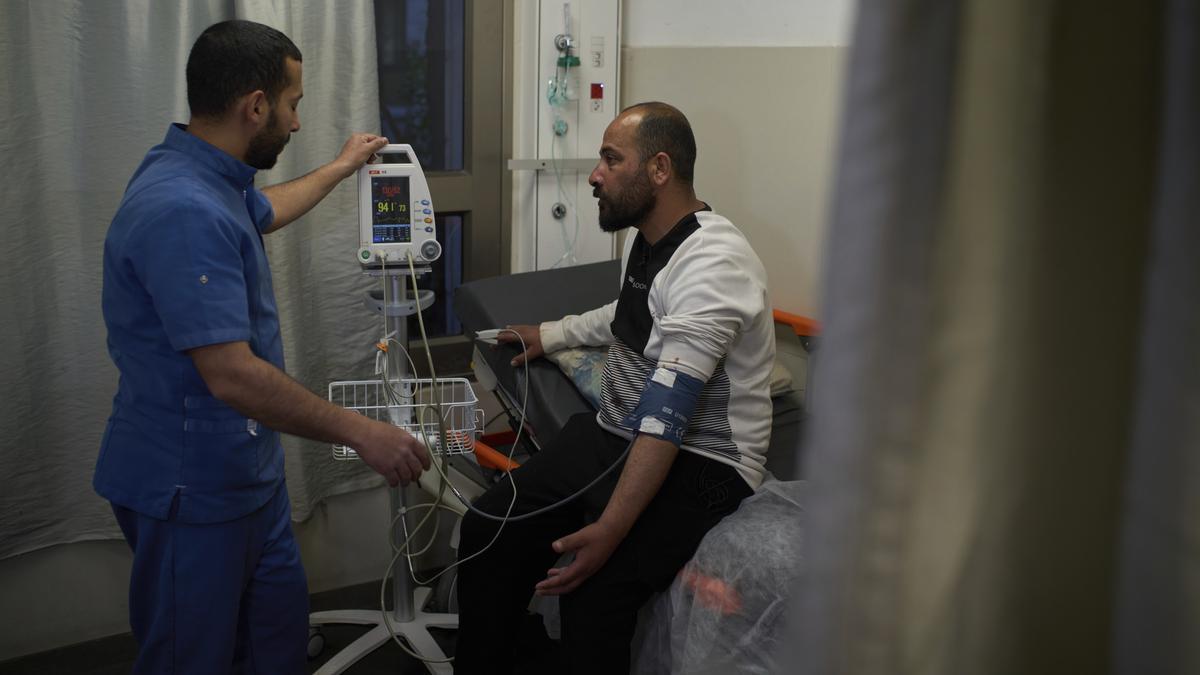
Sangeeta, a resilient farmer with her pink dupatta fluttering gently, presents a canvas to the lens. The artwork, completed in the fervor of 2021, captures a powerful scene from the massive farmers’ protest at Tikri Border, Delhi. A trolley packed with women protesters is depicted forging ahead to block a section of the highway, fists pumped high in defiance, while one brandishes India’s tricolor flag. The painting resonates with the energy of their chants and epitomizes the spirit of rebellion. “That moment was a culmination of excitement and the will of citizens to assert their rights,” narrates the artist behind the piece, Aban Raza. She witnessed the spectacle first-hand and immortalized it with her brushstrokes. “Witnessing various groups of women systematically involving themselves in the protest was extraordinary. They had devised a rotation system in which several women arrived from their villages to the border of India’s capital, stayed for a couple of days, then returned home, only to be replaced by fresh faces,” says Raza.
Aban Raza, an acclaimed contemporary artist residing in New Delhi, skillfully addresses the myriad ways Indian citizens make their voices heard and their presence felt in the public domain. Her subjects vary from Shaheen Bagh, the hub of the Citizenship (Amendment) Bill protests, to the pulse of the 2020-2021 Indian farmers’ protest skirting the capital’s contours. “The journey is fraught with moral questions,” she confides. “There are moments when I question my right to depict these stories from a position of privilege. However, with each attempt, there’s reassurance in endeavor.”
Nevertheless, immersing herself in narratives that highlight the divisions and growing economic disparities within the country can seem a descent into a proverbial rabbit hole for Raza – interspersed with feelings of despair. She expresses sorrow at incidents like the violent intrusions at Jamia Millia Islamia and Jawaharlal Nehru University, saying, “While amidst the chaos, it was challenging to comprehend their actions. But when you witness the degradation of lives and see a land you cherish fading, indifference is not an option.”
Raza’s visual chronicles extend beyond political churn, embracing the quotidian, the scenes often overlooked: farmers amidst harvest, women sharing moments of respite on a train journey, laborers toiling under the relentless sun at Delhi’s Rajpath.
A weight of responsibility lingers over Raza as she recognizes the monetary gains derived from capturing these societal upheavals. “The responsibility to support the causes I depict consumes me, particularly when profits are earned from selling a painting of a protest. It’s confusing, especially when a movement wanes and the beneficiaries are not easily identifiable,” she assesses. Despite these complexities, her exhibition ‘There is Something Tremendous About the Blue Sky’ in 2022 at Galerie Mirchandani + Steinruecke in Mumbai punctuated the art scene. Featuring the farmers’ protests, it resonated with audiences far beyond the usual art circles—reaching homes in Punjab, cited in newspapers, and inspiring an activist to transform her artworks into postcards that adorned fridges in distant abodes.
The streets echo with slogans that herald the construction of the Ram Mandir in Ayodhya, and Raza reflects on her artistic journey that began in 2014, mirroring the unraveling of democracy through the past decade. Her works are testimonies to tumultuous events, from the 2015 Dadri lynching to the contentious arrest of student activist Umar Khalid. Raza’s pilgrimage to the site of the Babri Masjid demolition in 2017 left a lasting impression—though devices were forbidden, the imagery remains etched in her mind, seeking manifestation on canvas to argue that “India’s past cannot be altered.”
Amidst her reflections, Aban Raza will soon acquire the Asia Arts Future (India) Award at the Asia Arts Game Changer Awards India during the India Art Fair in New Delhi. This accolade acknowledges artistic practices that articulate the lived experiences of South Asia. “Recognition comes unbidden, and it’s my creations that have made an impact, motivating me to persevere in this solitary path,” she sighs. Despite the risks, Raza is unwavering in her resolve: “I will not silence my voice or cease my fight. And although there may be times I must step back when the air grows perilous, I will continue to document the unfolding of events.”










